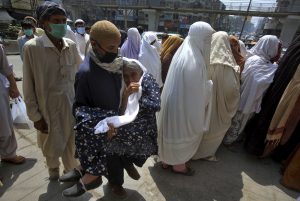Pakistan’s national government has followed a highly politicized approach to dealing with the COVID-19 threat. The result has reignited fears that the current government is not fit to rule the country let alone deal with a raging health crisis that is fast becoming a national security issue.
Over the last few months, there has been a steep decline in public trust about the capacity of the government’s efforts to deal with the COVID-19 threat. After putting in some surface-level effort, the government has nearly left the entirety of the country’s population at the mercy of the virus.
The government’s top decision-makers remain unprepared and unwilling to take the threat seriously. A few days ago, the Minister of State for Climate Change Zartaj Gul Wazir presented a novel definition of COVID-19 by saying that “COVID-19 means that it has 19 points that can be applied to any country in any way.” Another senior leader of the PTI who is also Sindh province’s Governor recently said that COVID-19 is nothing more than the flu and people shouldn’t worry about it.
It shouldn’t come as a surprise then that the current government’s approval ratings have fallen sharply in recent months. According to a recent Gallup survey, “The percentage of Pakistanis who believe that the current PTI government’s performance up to this point in its tenure is worse than that of the previous government has increased from 35 percent in December 2018 to only 59 percent in February 2020.”
The government’s political allies are either estranged or walking away to join the opposition parties. In the province of Punjab, several disgruntled lawmakers of the ruling party have been threatening to form forward blocks if they are not given development funds. A weak chief minister in the province often cites the phrase “I am not aware” regarding key decisions related to his province. A looming wheat crisis in the country has involved several top ministers of the government that manipulated the domestic market to make billions. The problem is expected to morph into a serious food crisis in Pakistan in the coming months.
The issue has created deep divisions within the government as Prime Minister Imran Khan has sidelined one of his key advisers, Jahangir Tareen, after his role in the wheat crisis was proved recently. Tareen, who has been credited with managing the ruling party’s political alliances, has not only fled the country, but has also left a vacuum to fill in the government. In the absence of Tareen, no one could effectively reach out and satisfy the government’s political allies.
Thus no one in the government has the political clout to negotiate with the head of the Balochistan National Party (BNP-M), Sardar Akhtar Mengal, who recently left the government to join the opposition. A few days ago, Mengal met with the chief of the Jamiat Ulema-i-Islam (JUI-F), Maulana Fazlur Rehman, to chart out a plan to potentially bring the government down. “In our meeting, we discussed the changes that have already taken place in the country and the changes which are about to come,” said Mr. Mengal.
Understandably, Mengal’s departure from the coalition has made the government weaker and its other political allies stronger. “MQM, PML-Q, GDA, and BAP may not walk out like Mengal did … but their threat of walking out will now hold greater weight for PTI. Do not be surprised if you see the allies becoming a bit more vocal in their grievances, a bit more aggressive in their dealings, and a bit more demanding in their requirements,” notes an op-ed published in Dawn.
Adding to the crisis are rising incidents of terrorism across the country. Last week, three consecutive explosions claimed by a little-known separatist group, Sindhudesh Revolutionary Army (SRA), has put policymakers on alert. Reports indicate that the group’s leadership operates from the province of Sindh and “wants the province to break from the Pakistani federation.”
In another incident on June 22, an officer and a soldier of the Pakistani Army were killed in clashes with militants in North Waziristan. Over the last few months, groups such as the Tehrik-e-Taliban Pakistan (TTP), the Islamic State (IS), the Baluchistan Liberation Army (BLA), the Baluchistan Liberation Tigers (BLT), and others carried out attacks across Pakistan. The list of militant organizations targeting Pakistan has now been joined by a new militant group known as the SRA.
It is a worrying development for Pakistan for two reasons. First, the rise in militant attacks is taking place at a time when a governance and health crisis is consuming law enforcement agencies majority of the focus. Second, the growth in attacks, particularly from new organizations, underscores that militant networks in the country or aspirations from different ethno-nationalist groups in this regard, remain strong. Thus, any sense of weakness from the state would be taken as an opportunity to mobilize operations to weaken the state further. Certainly, COVID-19 has exposed Pakistan’s looming governance and security woes.
Pakistan’s all-powerful military is monitoring all these developments closely. It would not be imprudent to argue that the military itself is strained due to the existing political and governance crisis that COVID-19 has brought to fore. Pakistan’s security establishment may want an increased role in managing politics in Pakistan, but it doesn’t mean that the institution is interested in running everything for the government.
The next few months are going to be very important for Pakistan as COVID-19 exposes the current government’s inability to govern effectively and manage its allies aptly. As political uncertainty grows in Pakistan, issues lying on the periphery have started to move to the core, challenging the country’s national security.
































